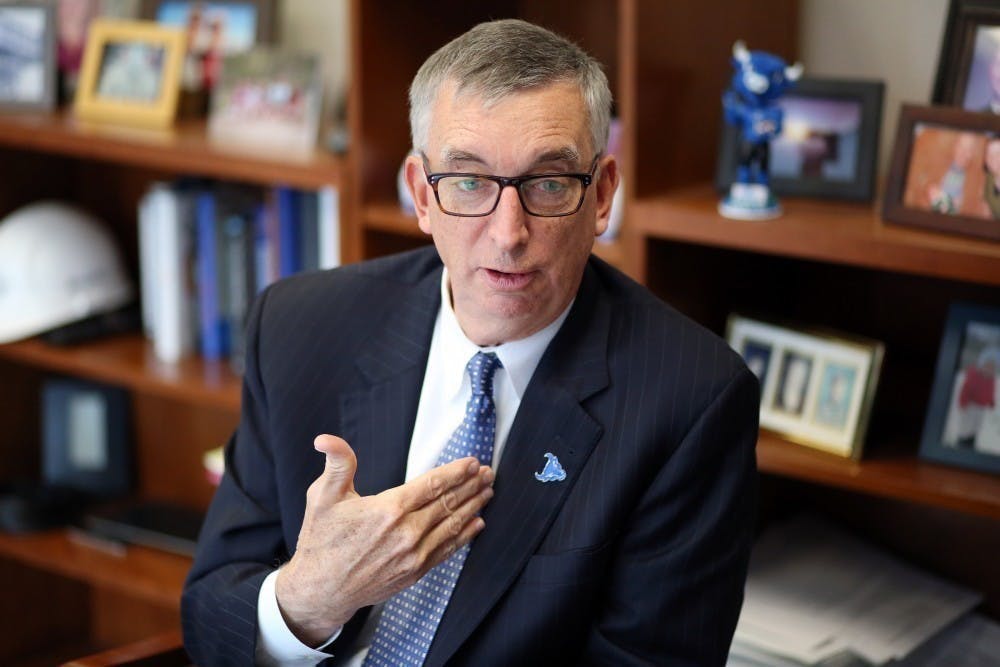Interim Provost A. Scott Weber confirmed Saturday that funded Ph.D. students will remain in assistantships, meaning they will continue to have benefits such as health insurance, dental insurance and retirement plans.
Some students worried their roles would change to fellowships –– which don’t include these benefits –– when the August Ph.D. Excellence Initiative announcement stated first-year Ph.D. students will not teach classes.
The provost’s office will provide $9.6 million of funding from 2019-22 to “bridge the gap” for all full-time funded Ph.D. student stipends, which increased to a base of $20,000.
Vice Provost Graham Hammill said the funding will come from increased enrollment, academic excellence and success fees and “deans reprioritizing their respective budgets.” Department budgets will cover all fees for the 2020-21 academic year.
UB Council Student Representative Michael Montoro said this is problematic, as all students –– including Ph.D. students for this year –– pay the academic excellence and success fee.
“So this is somehow [implying] that graduate students are paying for their own raises which is bizarre,” Montoro said. “We pay this fee and then we get [our] money back.”
The deans now also have the option to request additional funding from the university’s “operating budget,” a $753 million budget composed primarily of tuition revenue, student fees and state support, according to UB spokesperson John DellaContrada. Weber said this investment funding gives deans “flexibility” in order to reprioritize their budgets according to the “needs of their units.”
Each request for investment funding will be approved by Weber, President Satish Tripathi and Vice President for Finance and Administration Laura Hubbard.
Since first-year Ph.D. students will no longer teach classes, some students and faculty are concerned with who will instruct these courses and whether class sizes will increase.
“The number of courses cannot just be dramatically lowered, and vastly expanding class size is also a poor solution,” French professor Maureen Jameson said.
On Oct. 15, faculty members asked how much the Ph.D. Excellence Initiative would cost if enrollment remained the same, but Hammill and Weber weren’t able to give a definitive answer, according to Jameson.
“It just seems very strange to embark on such a profound change without knowing the dollar cost, let alone the impacts on undergraduate education, collective bargaining, graduate recruitment and faculty hiring,” Jameson said.
DellaContrada said the Ph.D. Excellence Initiative will have a positive impact on Ph.D. student recruitment, education and outcomes. The university does not expect it to negatively impact undergraduate education or faculty hiring.
Lewis Powell, director of graduate studies in the philosophy department, said he doesn’t think the funding timeline is long enough for the “massive realignment” of departments that he says UB is hoping for.
“There needs to be more than a year and a half to do it,” Powell said. “I don’t know how anyone could look [at] me [with] a straight face and tell me that’s the timeline they think is reasonable for what is agreed to be a massive shift in how [the College of Arts and Sciences] is conceiving a graduate education.”
Montoro said he thinks there should be 100% bridge-funding for five years to reflect the average length Ph.D. student appointments.
“Three years is quite a timeline, it’s more like we’re scrambling to get things done rather than [making] a constructive decision,” Montoro said.
However, deans feel the bridge-funding timeline is “appropriate,” according to Weber.
Many faculty and students still want to see the formation of the Living Stipend Solutions Committee, which the Faculty Senate passed in Spring 2019. This committee would be comprised of faculty, students and administrators to ensure stipend levels remain “competitive.” Weber said LSSC will not be formed because Ph.D. stipends have “already been addressed.”
Instead, the Graduate School Executive Committee will review and recommend policies and best practices for Ph.D. completion, maintaining competitive stipend levels and teacher training for TAs.
The news desk can be reached at news@ubspectrum.com.

Alexandra Moyen is the senior features editor of The Spectrum.
Brittany Gorny is the senior news editor.





